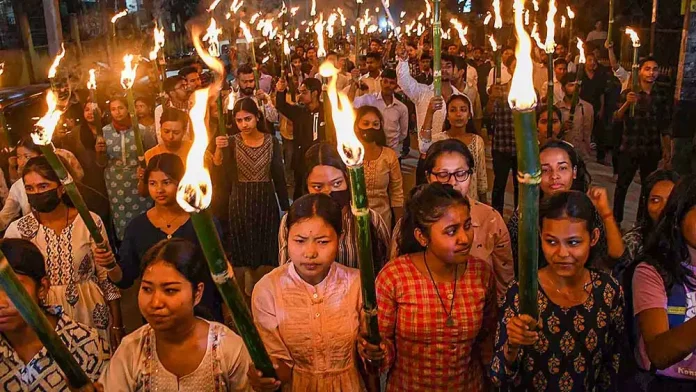In response to the recent notification of the Citizenship Amendment Act (CAA) by the Central government, protests have surged across various states in the country. The latest demonstration unfolded in Kerala’s Kozhikode district on Tuesday, March 12, orchestrated by the Fraternity Movement of India activists.
The protest, marked by its anti-CAA stance, saw a tumultuous clash between demonstrators and law enforcement. Notably, police forces intervened, leading to the arrest of eight Muslim protestors among the nine individuals booked. The intervention escalated as authorities resorted to lathi-charging approximately a hundred protestors outside the All India Radio (AIR) station in Kozhikode.
The arrested individuals have been identified as members of the Fraternity Movement, including Labeeb Kayakkodi, State Vice-President; Vaseem Ali, State Secretariat Member; Raees Ahammad, Kozhikode General Secretary; Aadil Ali, Kozhikode Vice-President; Nasim Abdul Latheef, Secretary, Area; along with members Safin Sabeer, Hasanul Banna, and Muhammad Savad. Additionally, Savad’s father, Anas, a member of the Welfare Party of India, was also detained.
Legal actions have been initiated against the accused under several sections of the Indian Penal Code (IPC), encompassing charges such as rioting, unlawful assembly, causing danger or obstruction in public spaces, assault on public servants, and offenses specified under the Kerala Police Act 2011.
In parallel, on March 11, a case was filed against 124 protestors affiliated with the Muslim Student Federation (MSF) and the Congress-affiliated National Student Union of India (NSUI) by the Thiruvananthapuram Museum Police. The charges include various sections related to rioting, unlawful assembly, and assault on public workers. The protestors had planned a march to Raj Bhavan. Additionally, the Railway Police Force (RPF) lodged a case against 40 NSU(I) members for obstructing train services.
Similar protests have unfolded across the nation, with significant demonstrations reported from Delhi and Assam. At Jamia Millia Islamia campus in Delhi, protests led by the MSF and NSUI attracted attention, while in Delhi University Arts Faculty, around 60 to 70 students affiliated with the All India Student Association (AISA) were detained during an anti-CAA protest on March 12.
In Assam, the Asom Jatiyatabadi Yuba Chatra Parishad (AJYCP) and the Congress party spearheaded protests against the CAA. Demonstrators resorted to burning effigies of Prime Minister Narendra Modi and Home Minister Amit Shah, alongside copies of the controversial law. Furthermore, CPI(M) workers staged a demonstration in Kamrup’s Rangia town.
The surge in protests follows the official notification of the CAA by the Modi government on March 11, 2024. The contentious act aims to grant Indian citizenship to individuals belonging to persecuted minority groups from Pakistan, Bangladesh, and Afghanistan, who arrived in India on or before December 31, 2014, encompassing various religious affiliations.




















Comments